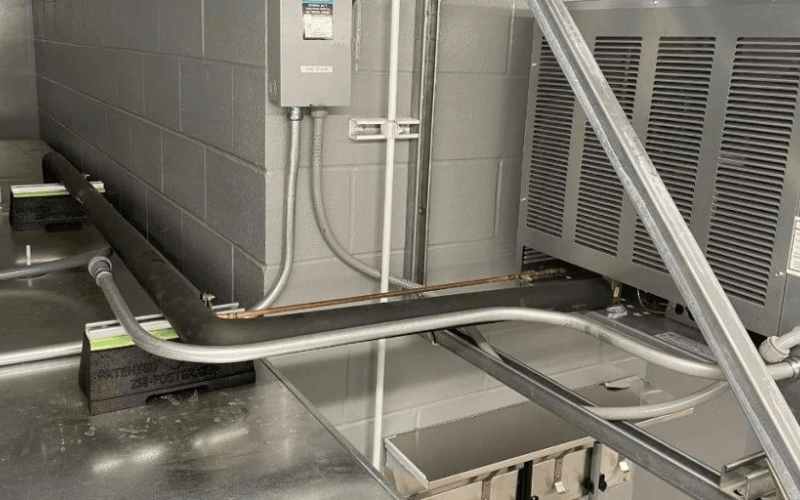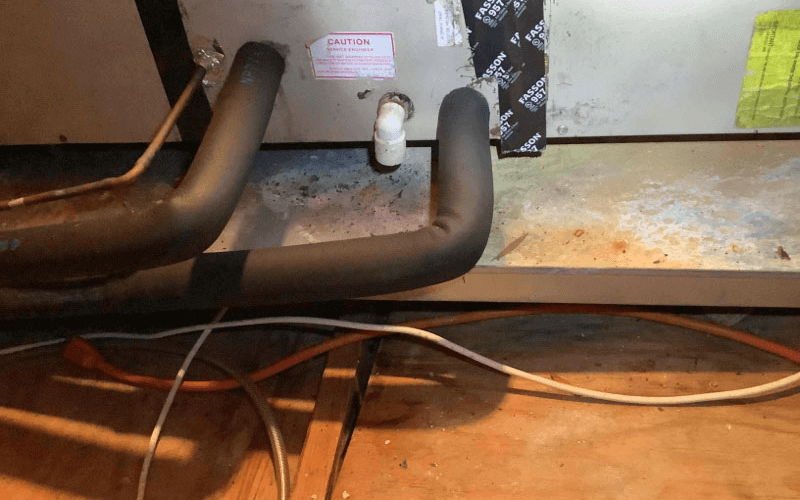Having a gas-powered heater is an excellent way to ensure that you stay warm during the winter months. It also implies that you should be on the lookout for any indicators of a gas leak in your home. Is it common to smell gas coming from a water heater? No, it is not typical. Your water heater should not have any odors, so if you’ve noticed a rotten stench and aren’t sure why, you should examine the gas inlet and take the necessary actions to solve the stinky problem as soon as possible! So, let’s take a deeper look at what you should do if you smell gas coming from your water heater.
Table of Contents
ToggleWhat Does a Gas Leak Smell Like?
Without the usage of chemicals, you wouldn’t be able to identify gas because it is naturally odorless. Gas gets its distinctive “rotten eggs” odor from added additives. If you catch even a whiff of this perfume, take the following precautions to protect yourself and your loved ones.
Why Does My Water Heater Smell Like Gas But There’s No Leak?
Although the smell of gas near your water heater is cause for alarm, it does not always indicate a leak. Gas odors can come from a variety of sources, some of which may not be as harmful as a leak, but all should be addressed. A badly calibrated or faulty burner, for example, can emit unburned natural gas or propane, causing an odor.
The odor could also be caused by a gas line that isn’t completely sealed, even if it isn’t leaking enough to be dangerous. In rare situations, sediment buildup at the tank’s bottom can cause scents similar to gas. Don’t dismiss the odor. Request the services of an expert to analyze the situation and make any necessary repairs or adjustments.
Also, Read: How Much Gas Does a Water Heater Use?
What Are the Symptoms of a Gas Leak?
The smell of rotting eggs is the most evident symptom of a gas leak. Another strong odor, such as sewage, sulfur, or gasoline, could be detected.
The following are more subtle symptoms of a gas leak in the home:
Plants that have died. Any gas that leaks from the mainline will poison the soil above it. Plants growing in this soil absorb the gas and wilt as a result.
A whistling or hissing sound. As gas departs the line or your heating system, it may hiss. When you switch on the heat, pay special attention to this sound. Contact a professional to inspect your heater for any signs of a gas leak.
Concerning symptoms. Don’t dismiss sudden bouts of nausea, exhaustion, or other symptoms of carbon monoxide poisoning. It is always preferable to be safe than sorry. Allow emergency responders to assist you if you suspect a Gas Leak.
Protect Yourself Against a Gas Leak
If you suspect a gas leak in your house heater, follow these procedures.
1. Shut Off Your Heater.
Turn off all heat on your thermostat and go to the main switch on your heater. Turn it off right away and move on to the next stage.
Also, Read: How To Replace Gas Valve On Water Heater?
2. Allow Clean Air to Flow Indoors by Opening Doors and Windows.
It is critical to prevent the gas from leaving the house. To get the gas out of your house, open all doors and windows as wide as they will go. Although this can assist in removing the gas and limiting your exposure, it does not imply you should stop there.
3. Evacuate The Home and Call for Emergency Services.
The smell of gas is an emergency, and you should phone 911 immediately. Firefighters are trained to detect and repair gas leaks in homes. They can also look for indicators of carbon monoxide poisoning in you and your family.
Make sure to remove any pets from the house as well. Stay out of the building until a gas technician or firefighter tells you it’s safe to return.
4. Schedule Repairs As Soon As Possible.
Following a gas leak, you must contact a professional heating firm to inspect your smelly water heater. You should never turn it back on or try to repair it yourself.
Other Common Reasons For Gas Smell
Although gas leaks are scary, they aren’t the only reason your water heater stinks. Other, less harmful, prevalent explanations are listed below.
Corrosion.
An anode rod is found in the majority of water heaters. Corrosive substances are drawn away from the tank by this rod. Instead, the compounds adhere to the rod, extending the life of your heater.
Some rods corrode over time, causing metal particles to be released into the water supply. These metals react with the other gases, resulting in unpleasant aromas in your water.
Bacteria.
Sulfate is present in all water sources, making it a good food supply for sulfur-reducing bacteria (SRB). As the bacteria digest the sulfates, hydrogen sulfide gas is produced. While water treatment techniques kill most bacteria, the SRB population can grow in water that is not cleansed and refilled.
Stagnant Water.
All appliances, including water heaters, require routine maintenance. Water stagnates and smells if it is not maintained.
A maintenance plan that includes occasional water flushing can help you avoid this problem. A professional will flush the system until it is empty. They will then replace it with fresh, clean water.
The scent of stagnant water can sometimes cling to the tank. After going untreated for a long time, even repeated flushings do not address the stinking problem. In this scenario, consider purchasing a new water heater and doing regular maintenance flushings.
Other Problems That Can Be Avoided By Flushing Your Water Heater Include:
- Mineral accumulation
- Corrosion on a large scale
- Components that have been clogged
FAQ
Is it normal to smell gas coming from the water heater?
Gas leaks, great or small, must be fixed. Leaks, if not repaired properly, can cause health problems and increase the risk of fires linked with larger leaks. If you smell gas near your water heater, you may have a leak.
How can I tell if my gas water heater is leaking?
Aside from the unpleasant odor, gas leaks can also be detected by the presence of hissing sounds. When a hissing or rustling sound of air seeps from your gas water heater, it is a clear indication that your system allows the gas to escape easily.
Is a slight gas smell normal?
When you turn on your furnace, gas is sometimes emitted. When you open the windows, the odor should fade quickly because it is usually subtle. If the stink spreads throughout your home and does not go away, it is most likely caused by a leak. A leak could cause a fire or pollute your home.
How do I get my hot water heater to quit smelling?
To remove sulfate-reducing bacteria from the water heater, boost the water temperature to over 140 degrees Fahrenheit for 8 hours. Bacteria die at temperatures above 140 degrees Fahrenheit. To conduct this method safely, first, ensure that your water heater has a working temperature and pressure relief valve.





















